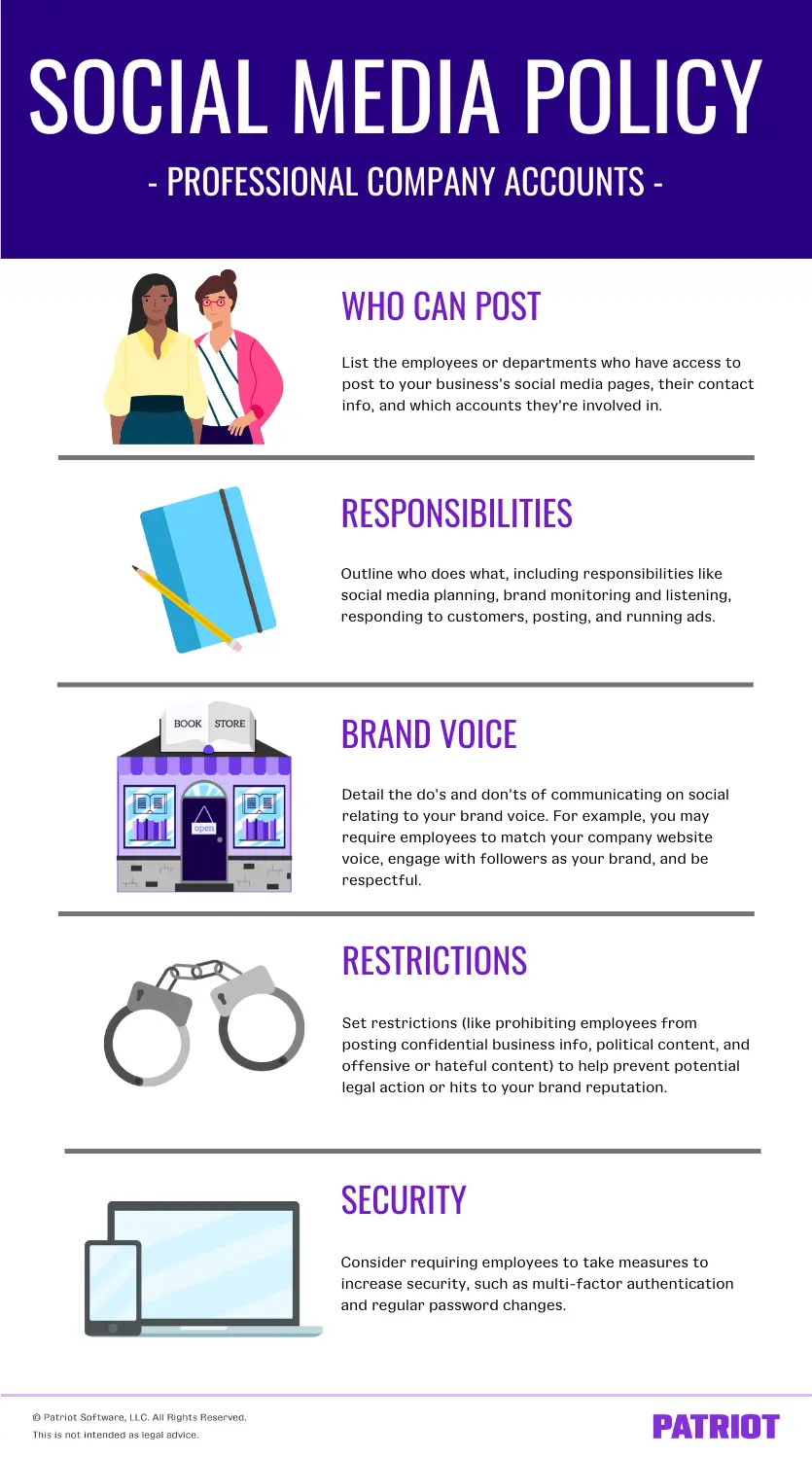Over 70% of adults in the U.S. use social media. And among businesses with over 100+ employees, 92.1% of U.S. marketers use social media. With such high social media usage nationwide, businesses can benefit from having guidelines in place. So if you don’t have one already, it’s time to implement a social media policy for employees.
An employee social media policy can provide guidelines for how employees use:
- Your business’s social media accounts
- Their personal social media accounts
Creating your social media policy for employees
A company social media policy is a document that details guidelines and restrictions for both personal and company social media accounts. You may consider consulting a small business lawyer to help you draft an explicit policy that mitigates potential problems relating to social media misuse.
Implement a social media policy for employees to:
- Avoid posts that damage your business’s reputation
- Maintain a consistent brand voice across all media channels
- Protect your company from security risks (e.g., hacking)
- Educate employees on how to respond to customers
- Outline employees’ social media responsibilities
Pro Tip: If you want your policy to do its job, it must be understandable. Steven McConnell, Director Of Sales & Marketing at Arielle, comments on how important clarity is:
Many policy copies are written full of jargon and technical terms which opens doors for misinterpretations and confusion. Therefore, the tip I have for employers creating a social media policy is to ensure it’s as clear and exhaustive as possible, and constructed using easily comprehensible tones and language as the copy applies to everyone in the organization.”
Again, you should provide guidelines and restrictions for employees who use your company’s accounts and those who have personal accounts. Read on to learn how to create a policy that addresses both.
Social media policy guidelines for employees (professional accounts)
Employees who use your company’s social media accounts (e.g., Facebook, LinkedIn, etc.) need a rulebook. That way, they know exactly what their roles and responsibilities are and the types of posts that are off-limits.
Address the following in your social media policy for employees who use your company accounts:
- Who can post
- Responsibilities
- Brand voice
- Restrictions
- Security

1. Who can post
Which employees control your business’s social media accounts? List the employees or departments involved in your social media policy, contact information, and which accounts they’re involved in.
For example, you may give team members from the following departments access to company social media accounts:
- Marketing (to build brand awareness and attract leads)
- HR (for recruiting purposes)
- Customer service (to answer customer questions and concerns)
Detail which departments or positions have control of your business’s social media presence and what their unique roles are.
2. Responsibilities
Whether you have two or 20 employees involved in your company’s social media accounts, you need to outline responsibilities.
Social media responsibilities may include:
- Social media planning: Who is responsible for planning the social media content calendar and how often to post?
- Brand monitoring and listening: Who is in charge of finding posts about your business and addressing them?
- Responding to customers: Who is in charge of responding to customers? Should employees ever hide or delete comments?
- Posting: Who will be posting on your social media sites?
- Running ads: Who is responsible for creating, budgeting, and putting out paid advertisements on social?
3. Brand voice
No matter which employee is talking on your business’s behalf, your brand voice should be consistent.
If you have brand voice guidelines, mention them in your social media policy. Detail the do’s and don’ts of communicating on social media.
Your social media policy might require employees to:
- Speak in the same voice as what’s on your company website
- Engage with followers as your brand rather than as themselves
- Be respectful when responding to comments
4. Restrictions
What can and can’t your employees do and say on your company social media accounts? Set restrictions to help prevent crises, like legal action or hits to your brand reputation.
For example, you might prohibit employees from posting:
- Confidential business information
- Political content
- Offensive or hateful content
Daniel G. Leone, Personal Injury Lawyer at NJ Law Results, shares his expertise on the importance of creating guidelines that protect confidential information, saying:
At a minimum, I believe that a social media policy should address guidelines on content that shares private information about the company. This is especially important when it comes to a business’ client information. Every employee who is trained on the business social media and has access to the accounts should know not to breach the confidentiality of the employer, employees, and customers.”
5. Security
Another consideration and must-have in your policy revolves around security. After all, the last thing you want is someone to hack your company’s social media and tarnish your brand.
To increase social media security, you may require employees to:
- Use multi-factor authentication
- Only use certain devices to access company accounts
- Change passwords regularly
- Report suspicious behavior immediately
Social media policy guidelines for employees (personal accounts)
And now, what’s the social media conduct for employees using their personal accounts?
When it comes to a personal social media policy for employees, you may include:
- Social media use at work (e.g., off limits)
- Security best practices (e.g., advise employees not to include personally identifiable information)
- Restrictions* (e.g., not to share confidential business information)
*The types of restrictions you can implement may be limited. There are state laws that protect employee rights for certain off-duty conduct. Consult your state laws and set guidelines on what kind of off-duty social media activity is always off-limits (e.g., harassment).
Want to be the first to know?
Get the latest small business news delivered straight to your inbox.
Subscribe to Email ListHow to distribute your social media policy in the workplace
Created a solid plan? Great! Now, you want to circulate it around your business so your employees know it exists.
Include your social media policy in your employee handbook so employees can access it when they have questions. When you hire someone new, you may consider asking employees to read and sign the handbook to ensure they agree to your company’s policies.
For easier access, upload a copy of your social media policy and employee handbook in your employee self-service system.
Distributing your social media policy to employees isn’t the end of the line. Social media changes constantly, so make sure to update your policy as needed and communicate any changes to your employees.
This is not intended as legal advice; for more information, please click here.



